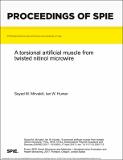A torsional artificial muscle from twisted nitinol microwire
Author(s)
Hunter, Ian W.; Hunter, Ian; Mirvakili, Seyed Mohammad
Download101630S.pdf (802.1Kb)
PUBLISHER_POLICY
Publisher Policy
Article is made available in accordance with the publisher's policy and may be subject to US copyright law. Please refer to the publisher's site for terms of use.
Terms of use
Metadata
Show full item recordAbstract
Nitinol microwires of 25 μm in diameter can have tensile actuation of up to 4.5% in less than 100 ms. A work density of up to 480 MPa can be achieved from these microwires. In the present work, we are showing that by twisting the microwires in form of closed-loop two-ply yarn we can create a torsional actuator. We achieved a revisable torsional stroke of 46°/mm with peak rotational speed of up to 10,000 rpm. We measured a gravimetric torque of up to 28.5 N•m/kg which is higher than the 3-6 N•m/kg for direct-drive commercial electric motors. These remarkable performance results are comparable to those of guest-infiltrated carbon nanotube twisted yarns.
Date issued
2017-04Department
Massachusetts Institute of Technology. Department of Biological Engineering; Massachusetts Institute of Technology. Department of Mechanical Engineering; Koch Institute for Integrative Cancer Research at MITJournal
Proceedings of SPIE--the Society of Photo-Optical Instrumentation Engineers
Publisher
SPIE-Intl Soc Optical Eng
Citation
Mirvakili, Seyed M., and Ian W. Hunter. “A Torsional Artificial Muscle from Twisted Nitinol Microwire.” Edited by Yoseph Bar-Cohen. Electroactive Polymer Actuators and Devices (EAPAD) 2017 (April 17, 2017).
Version: Original manuscript
ISSN
0277-786X